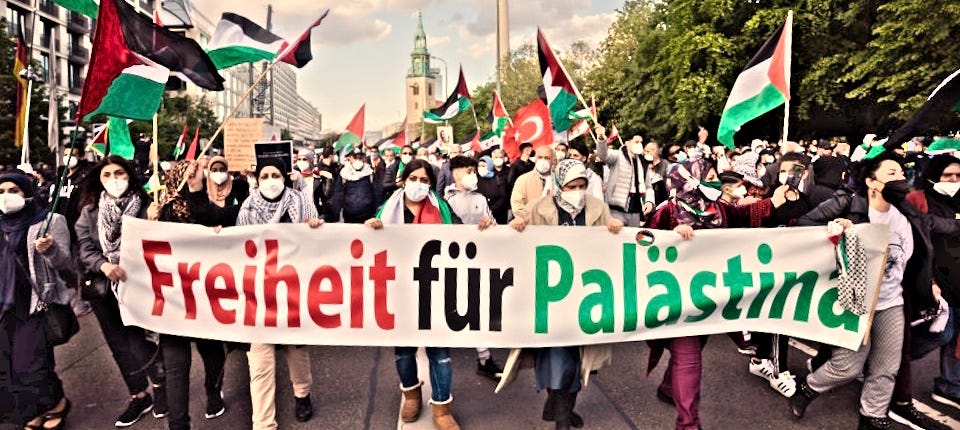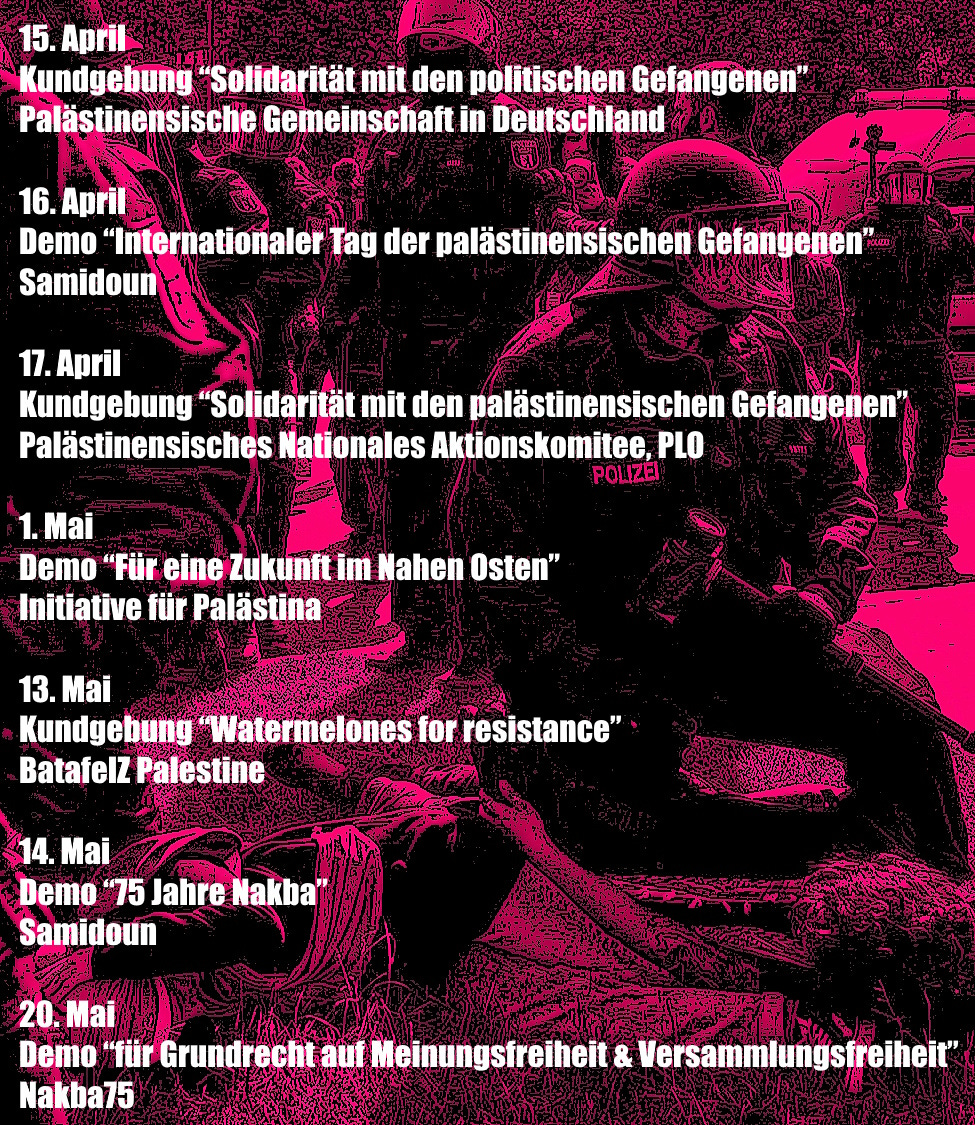Berlin’s unprecedented aggression towards Palestinian visibility and solidarity
Singing for Palestine, dabke dancing and even watermelons affected. Seven events banned. Reports of intimidation, surveillance and police violence.
Mysterious video
The Berlin police's reasoning for the ban of Palestinian demonstrations can be summarized in two points: "propensity to violence" and "racial incitement through anti-Semitic statements." Regarding the first, the police claim point to previous incidents of violence, whereas regarding the latter they are relying on a video circulated on social media from a demonstration on April 8 in which the phrase "Death to Jews" can be heard uttered once, somewhat unclearly, said by a single individual whose identity cannot be ascertained from the video. The group responsible for organizing the demonstration, Samidoun, responded with the following:
The identity of this person is completely unclear, as well as her reason for this call or even whether she was participating in the demonstration. One thing is clear: she had nothing to do with the organization, direction, leadership or political framework of the mobilization, and this statement does not reflect our clear anti-racist, anti-colonial vision for a liberated Palestine.
Nevertheless, denunciation and hate directed at pro-Palestinian gatherings in the media and on various political levels grew, culminating in the Berlin police banning three gatherings, scheduled for April 15, 16 and 17, in solidarity with Palestinian prisoners in Israeli jails on Palestinian Prisoners Day.
Black-clad photographers
Nakba75 activists relayed to me their full solidarity with Samidoun and all Palestinians affected by repression and anti-Palestinian racism in Germany. As far as the viral video, they noted the common presence of groups dressed in black using high-quality cameras to take close-up portraits (illegal in Germany) of demonstrators’ faces at pro-Palestinian rallies, and when asked, refuse to show a press card or to indicate media affiliation, against the German Press Code.
This was also made clear in a video by Jewish filmmaker Dror Dayan, in which he tries in vain to ask several black-clad photographers at a rally for their identities. And although Dayan makes it clear to them that he feels threatened as a Jewish person because black-clad German-looking people are constantly filming him, he receives no response.
Dayan tells me how such people often work together at pro-Palestinian gatherings and are commanded by one person. He sees it as a deliberate intimidation tactic, scaring participants and giving them the impression they are under constant surveillance. There additionally could be severe consequences for those with precarious residency if accusations were made via doctored videos. Dror also notes:
As a Jewish person, I feel exploited above all: it is clear to me that they – to all appearances mainly ethnic Germans – harass and spy on me and my comrades in the name of ‘fighting anti-Semitism’ and ‘protecting Jewish lives’. They are only interested in Zionism; they don't give a damn about the safety of Jewish people in Germany.
Seven gatherings banned
The ban on pro-Palestinian gatherings in Berlin was not limited to the events around Palestinian prisoners, but extended to four other gatherings in May commemorating the 75th anniversary of the Nakba. One of these was a watermelon event at the Brandenburg Gate, planned by the Palestinian and Jewish Women's Collective.
Questionable notification
I received a copy of the 15-page ban notification issued by the Berlin police for the demonstration planned by Nakba75 for May 20, in which reference is made to the current situation in the Middle East. Paradoxically, attacks on Palestinians by Israeli security forces, as in the case of the Al-Aqsa mosque in Jerusalem, described in the notice as “security incidents, clashes, confrontations” and Israeli air strikes on civilians in Gaza, referenced with the far-right Israeli government’s term "military operation [shield and arrow]", are used as narratives to ban Palestinian rallies and protests because of their ethnic background.
The ongoing violence by Israeli settlers against Palestinians, especially ongoing pogroms including in Hawara or the fascist flag march in Jerusalem, find no mention in the Berlin police's ban notice. It is also disconcerting that the Palestinian Nakba was frequently placed in quotation marks.
In addition, "comparable gatherings", most of which took place several years ago, were mentioned in which individual incidents were quoted: in addition to anti-Semitic statements such as "Death to the Jews" and "Jews=Child Murderers", reference was made to non-anti-Semitic calls such as "Allahu Akbar", "Boycott Israel" and "Free-Free Palestine", which were presented as "clearly militant".
For one demonstration in May 2021, Berlin police based their ban on an article in the daily Die Welt newspaper, known for its one-sided pro-Israel coverage. It was also noted that "organizations or initiatives" such as BDS, Palestine Speaks, Jüdische Stimme (Jewish Voice Germany) and berlinleft had called for participation in the gathering on social media under the internationally circulated hashtag #Nakba75.
"Racist framing"
But what was most controversial, mentioned several times in the ban, was the potential participation of "emotionalized young people from the Palestinian, Arab and Muslim diaspora" who would "chant punishable slogans and display banned symbols" and who were "not averse to violent action," something strongly condemned by journalists and human rights activists on social media as racist framing.
"With peaceful mass demonstration in Berlin for Nakba Day 2021, Palestinian, Jewish, German and others standing with us have proven how Palestine solidarity has grown in recent years. This solidarity endangers the German narrative that declares Israel's security as the ‘reason of state’," noted Nakba75 activists on the bans and further make clear that "Because solidarity is growing, repression is getting stronger. The racist remarks in the bans against the demonstrations underline this.”
They point to the police's descriptions of a young, emotional, more radical group with migrant background and, on the other hand, a somewhat more moderate group associated with an intellectual class of students as a deliberate mechanism to portray resistance as infantile, uneducated and emotional. It is also intended to drive a wedge between different groups in order to delegitimize their political analysis and strategy.
Surveillance, intimidation and police violence
According to several witnesses, the Palestinian cultural festival on May 13 at Hermannplatz in Neukölln (Berlin) saw disproportionate police presence. Unusually for a cultural festival, the entire event was closely monitored and police repeatedly made threats that any politics would be interpreted as a ‘substitute event’ for the banned gatherings and that the event would be disbanded accordingly. Stalls were regularly and thoroughly examined, flyers and posters were removed and speeches were banned altogether. Even a singer's performance was cut short after two songs on the pretext that his lyrics were political. Even the Palestinian folk dance, Dabke, was not spared when the police prevented visitors from dancing.
The only authorized gathering was a rally by the Jewish Voice for a Just Peace in the Middle East together with other Jewish groups such as the Jewish Bund on May 20 to commemorate the Nakba. However, this was violently broken up by the police, with several Jewish and Palestinian activists arrested. A spokesperson for the Berlin police claimed that 80 to 100 "Palestinian supporters" massively disrupted the rally at Oranienplatz, stating, "Interpreters and language mediators from the police determined that there were anti-Semitic slogans coming from within the group. Our task forces had to intervene and exclude the disruptors from the gathering."
This was directly refuted in a video message by the Jewish Bund and in a statement by Jewish Voice, which Udi Raz, a member of the group's board, also confirmed to me: "Our rally was the only public gathering in Berlin that was not banned by the Berlin police. Accordingly, Palestinian activists were also present. In the course of the rally, the police asked us whether certain groups should be excluded from the rally. As organizers we clearly said no, all those present are welcome here. Shortly after, the Berlin police stormed into the crowd and began brutally beating and arresting several Palestinian and Jewish activists."
Asked if anti-Semitic slogans were chanted at all and what they would have been, Raz replied:
"The police's justification for their violence was that activists had shouted ‘Palestine will be free, from the river to the sea’. We, as Jewish Voice, do not recognize any anti-Semitism in this call: on the contrary, we stand behind this logic, according to which all people living between the Jordan River and the Mediterranean Sea must have the same rights."
Whether pro-Palestinian rallies will be held again in Berlin soon, especially next year around Nakba Day, remains an open question. What is certain, however, is that politicians do not want to see solidarity with Palestine on the streets of the German capital.
Translated by Isuf.







